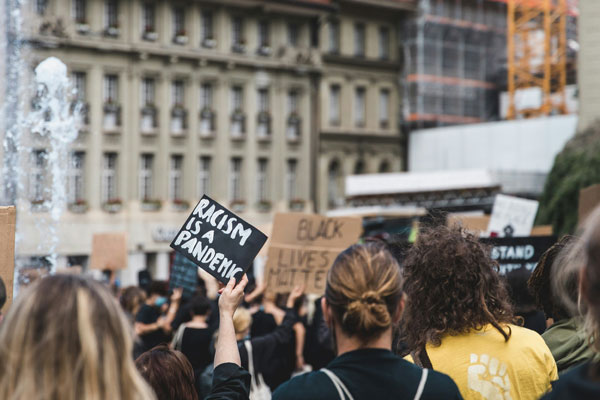The European court declares racial profiling in Zurich a violation of human rights

[Racism is a Pandemic sign at Black Lives Matter protest in Bern, Switzerland. Credit: Unsplash]
In February 2024, the Chamber of the European Court of Human Rights (ECHR) unanimously ruled that a police stop of a Black man at Zurich train station was discriminatory and violated Article 14 (prohibition of discrimination) in conjunction with Article 8 (right to private life).
This decision brought international attention to the issue of racism in Switzerland.
The plaintiff, a Swiss citizen of Kenyan origin, Mohamed Wa Baile, took the case to the ECHR after Swiss courts had refused to rule on his discrimination claims of being racially profiled by the police solely based on his skin color.
Indeed, as Wa Baile’s case has revealed, a survey conducted by the Swiss Federal Statistical Office reported that one in six people living in Switzerland had experienced discrimination.
The serious problem of xenophobia – the fear and hatred of foreigners that manifests itself in prejudice against them – in Switzerland is anything but new, as the country has a long history of negative attitudes towards immigrants that stretches over many years.
In the early 1970s, Switzerland began to limit the number of foreign workers after a surge in immigration following the Second World War.
The post-war demand for labor attracted migrants from countries such as Italy, Portugal, and Spain.
In an effort to eradicate such attitudes, which often escalate into racism, the Swiss government established the Federal Commission against Racism (FCR) in 1995.
The independent advisory body aims to prevent and address racial discrimination by providing recommendations, legal guidance, and raising public awareness.
A recent report by the FCR revealed a worrying trend: racist incidents in schools rose by 24% compared to the previous year, which is a cause for concern as hate crimes involving children are considered to be particularly heinous.
FCR officials agree that the worst of discrimination is often directed at black children, who are repeatedly insulted in the class chats, called the N-word, or locked in the equipment room during PE lessons where they are subjected to racial slurs by classmates.
In fact, the number of reported racist incidents in schools has been increasing every year, leading some to argue that increased awareness and sensitivity due to more education and vigilance explains the growing number of reports, rather than an increase in the number of incidents.
However, FCR, as well as many other Swiss citizens, disagree and believe that legal actions to prevent future acts of racism, especially in schools, are necessary.
Articles 261 of the Swiss Penal Code and 171 of the Military Code prohibit racial discrimination, and victims can seek legal recourse through legal channels, which reinforces Switzerland’s commitment to actively combat racism.
Some blame the outcome of the 2023 Swiss election to the rise of xenophobia, as far-right political parties have effectively used national symbols and rhetoric to incite fear and hatred against foreigners.
Others point to the escalation of tensions in the Middle East as the cause of the rise in xenophobia and racism in Switzerland, with the extreme social costs of discrimination, such as lost opportunities in education and labor force participation.
The general consensus among the Swiss public is that racism has no place in a country with a longstanding reputation for advocating peace.
Many believe Switzerland must address racism through policy and reform.

- Steven Chanoh Bang / Grade 10
- Institut Le Rosey

![THE HERALD STUDENT REPORTERS [US]](/assets/images/logo_student_us.png)
![THE HERALD STUDENT REPORTERS [Canada]](/assets/images/logo_student_ca.png)
